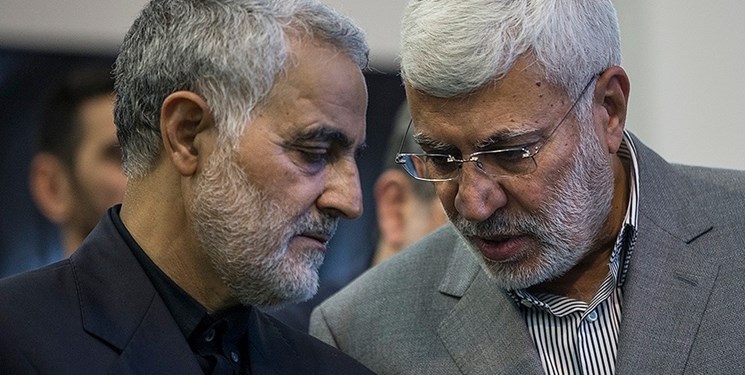Iran Lauds Iraq for Issuing Trump’s Arrest Warrant over Assassination of Resistance Commanders
Iran’s Judiciary Chief Seyed Ebrahim Rayeesi praised his Iraqi counterpart Fayek Zidane for pursuing the case with the assassination of resistance commanders, Lieutenant General Qassem Soleimani and Abu Mahdi al-Muhandis, and issuing an arrest warrant for former US President Donald Trump as the main perpetrator of this criminal assassination, and further stressed the need to follow up the issue to prevent Washington from committing similar crimes.

“You know very well that if the Americans are not prosecuted for this crime, they will dare to commit similar crimes not only in Iraq but also in different countries,” Rayeesi said in his Tuesday meeting with the Chairman of the Iraqi Supreme Judicial Council Fayek Zidane.
“The domineering system may not allow access to the main culprits by its own means, but a serious will to prosecute the perpetrator(s) is a very important, effective and admirable issue to prevent similar crimes,” he added.

The official warned Americans that they have committed state terrorism in an independent sovereign country that has its own administrative and legal system, stressing that by violating the sovereignty of that country, they committed an unforgivable crime.
Earlier on Tuesday, Ebrahim Rayeesi had blasted the US terrorist acts, and said that the assassination of anti-terror commander Lieutenant General Qassem Soleimani and Iraq’s Abu Mahdi al-Muhandis will not go unanswered.
Rayeesi made the remarks on Monday night upon his arrival at Baghdad International Airport and when speaking to reporters near the memorial of Resistance commanders.
“We will surely take avenge the assassination of General Soleimani,” he told reporters in the Iraqi capital.
He pointed out that martyrs Soleimani and al-Muhandis belong to the Islamic Ummah and humanity, reiterating that the assassination of these two great commanders of Islam will never go unanswered.
“These two people and their companions were heroes in the fight against terrorism and heroes in creating security for Iraq, Iran, and the region … Those who martyred them do not want the people of Iran and Iraq to live in security,” Rayeesi added.
Rayeesi is in Baghdad at the invitation of his Iraqi counterpart Fayek Zidane.
Rayeesi is visiting Iraq at the head of a high-ranking delegation to discuss mutual judicial issues with Zidane.
The Iranian delegation will visit the headquarters of the Iraqi Supreme Judicial Council on Tuesday to sign several memoranda of understanding (MoUs) for further judicial and legal cooperation.
The Iranian judiciary chief is also slated to follow up on the case of the assassination of General Soleimani and his companions.
General Soleimani played an influential role in the battle of Iraqi and Syrian nations against the world’s most notorious Takfiri terror groups, the ISIL and al-Qaeda.
Lieutenant General Soleimani was assassinated in a US drone strike on Baghdad International Airport in Iraq on January 3, 2020, upon an order by Trump.
The airstrike also martyred Deputy Commander of Iraq’s Popular Mobilization Forces (PMF) Abu Mahdi al-Muhandis. The two were martyred in an American airstrike that targeted their vehicle on the road to the airport.
Five Iranian and five Iraqi military men were martyred by the missiles fired by the US drone at Baghdad International Airport.
On January 8, 2020, and after the funeral ceremony of General Soleimani, the IRGC Aerospace Force started heavy ballistic missile attacks on US Ein Al-Assad airbase in Southwestern Iraq near the border with Syria and a US operated airbase in Erbil in retaliation for the US assassination of General Soleimani.
Ein Al-Assad is an airbase with a 4km runway at 188m altitude from sea levels, which is the main and the largest US airbase in Iraq. Early reports said the radar systems and missile defense shields in Ein Al-Assad failed to operate and intercept the Iranian missiles. Unofficial reports said the US army’s central radar systems at Ein Al-Assad had been jammed by electronic warfare.
The second IRGC reprisal attack targeted a US military base near Erbil airport in Iraqi Kurdistan Region in the second leg of “Martyr Soleimani” reprisal operation.
Iraq said the attacks had not taken any toll from its army men stationed at these two bases. The US army had blocked entrance into Ein Al-Assad to everyone, including the Iraqi army.
The IRGC officials said none of the missiles had been intercepted.
Meantime, Iran announced in late June that it had issued arrest warrants for 36 officials of the US and other countries who have been involved in the assassination of the martyred General Soleimani.
“36 individuals who have been involved or ordered the assassination of Hajj Qassem, including the political and military officials of the US and other governments, have been identified and arrest warrants have been issued for them by the judiciary officials and red alerts have also been issued for them via the Interpol,” Alqasi Mehr said at the time.
He said that the prosecuted individuals are accused of murder and terrorist action, adding that Trump stands at the top of the list and will be prosecuted as soon as he stands down presidency after his term ends.
Last month, Iran’s Judiciary Spokesman Gholam Hossein Esmayeeli said that Tehran has asked Interpol to issue a red notice for all perpetrators and masterminds of the assassination of General Soleimani.
“Iran has asked the Interpol for the apprehension of the US president and 47 others in connection with the assassination of Lieutenant General Qassem Soleimani near the Iraqi capital, Baghdad, last year,” Esmayeeli announced.
He added that Iran has identified 48 people in connection with the targeted terror attack and that includes US President Donald Trump, Pentagon officials and terrorist American forces in the region.







